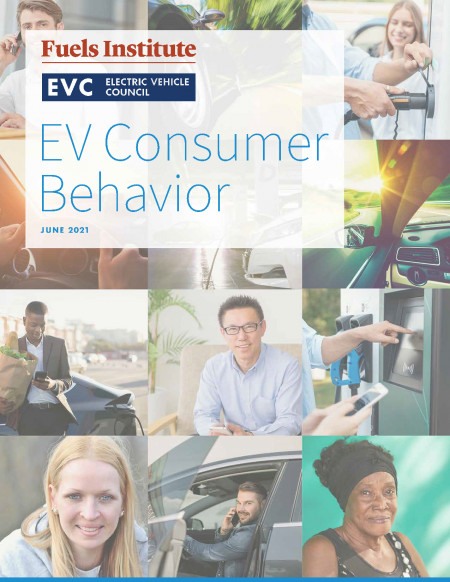New Report Helps Guide Deployment of EV Charging Infrastructure to Satisfy Driver Needs

ALEXANDRIA, Va., June 15, 2021 (Newswire.com) - As more EVs are incorporated into the U.S. transportation fleet, the need to build an expansive network of publicly accessible charging locations becomes increasingly important. A strategic plan to deploy electric vehicle service equipment (EVSE) must take into consideration the driving and charging behavior of current EV owners and the anticipated behavior of future ones. A new report from the Fuels Institute Electric Vehicle Council, EV Consumer Behavior, provides invaluable insight to help guide market development by reviewing the prevailing literature and presenting what is known about the habits of current EV owners and how that might change over time.
The report analyzes and presents findings from various publicly available sources to answer five questions:
- Who is the customer?
- When and where does the customer recharge?
- Why does a customer choose a particular recharging facility?
- How do customers interact with charging equipment?
- What do customers do at facilities while charging?
"The EV landscape continues to change at a rapid pace," said Fuels Institute executive director John Eichberger. "We recognized that the charging infrastructure must be built to satisfy the needs of current and future drivers. The needs and behaviors of early adopters of any technology can be quite different from the needs of those consumers who transition later in the market development curve. This report aggregates current published knowledge about these behaviors and needs to help build an EVSE system that effectively satisfies EV driver demand now and tomorrow."
With the Biden Administration's intent to support the expansion of the EV market and the increasing pace of vehicle manufacturers adding EVs to their product lineups, it's likely that the demographics of the EV driver, and their individual needs and preferences, will evolve quickly. Today's top demographic of EV owners are middle-aged white men earning more than $100,000 who own a home with a garage to support home charging. But this profile is expected to normalize and more closely reflect the general population of vehicle owners as more EVs enter the market, increasing options and reducing costs. While current EV owners find ways around the limitations of today's charging infrastructure, future buyers will likely require greater availability and convenience from the charging network.
"Understanding the various demographics of the EV driver and their associated behaviors is essential to providing them with an EVSE system that supports their needs," Eichberger explained. "This report dives deep into these five questions, presenting the latest insights from what is currently known. It also goes beyond a literature review and uses these insights to create five relatable personas representing future EV drivers. This approach helps bring to life how different drivers might use their EVs and what they need from the EVSE system."
Download a free copy of Fuels Institute's EV Consumer Behavior today.
Contact:
Donovan Woods
dwoods@fuelsinstitute.org
Source: Fuels Institute
